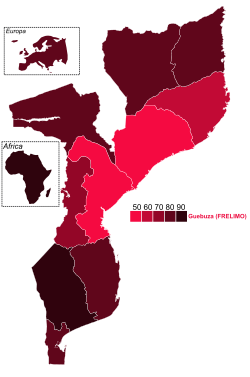Mozambique was a Portuguese colony, overseas province and later a member state of Portugal. It gained independence from Portugal in 1975.
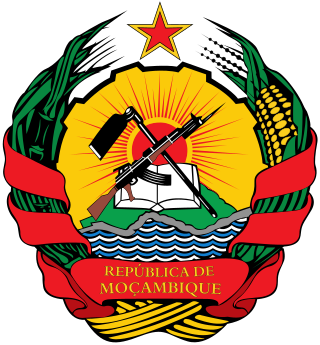
Politics in Mozambique takes place in a framework of a semi-presidential representative democratic republic, whereby the President of Mozambique is head of state and head of government in a multi-party system. Executive power is exercised by the government. Legislative power is vested in both the government and the Assembly of the Republic.
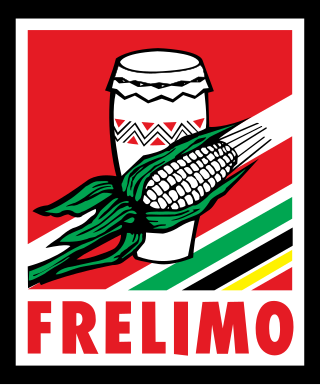
FRELIMO is a democratic socialist political party in Mozambique. It has governed the country since its independence from Portugal in 1975.
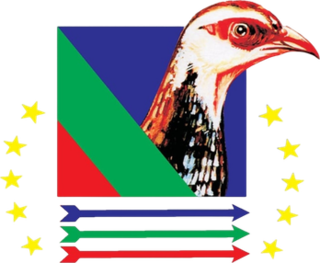
RENAMO is a Mozambican political party and militant group. The party was founded with the active sponsorship of the Rhodesian Central Intelligence Organisation (CIO) in May 1977 from anti-communist dissidents opposed to Mozambique's ruling FRELIMO party. RENAMO was initially led by André Matsangaissa, a former senior official in FRELIMO's armed wing, and was composed of several anti-communist dissident groups which appeared immediately prior to, and shortly following, Mozambican independence. Matsangaissa, who died in 1979, was succeeded by Afonso Dhlakama, who led the organization until he died in 2018. He was succeeded by Ossufo Momade.

The United Nations Operations in Mozambique was a UN peace mission to Mozambique established in December 1992 under Security Council Resolution 797 with the assignment to monitor the implementation of the Rome General Peace Accords agreed upon by the Mozambican president Joaquim Chissano of FRELIMO, the Front for Liberation of Mozambique, and Afonso Dhlakama of RENAMO, the Mozambican National Resistance. The operation was one of the most significant and extensive UN operations and it sought to demobilize and disarm troops, provide humanitarian aid, and oversee the elections. The operation ended in December 1994.

Armando Emílio Guebuza is a Mozambican politician who was the third President of Mozambique from 2005 to 2015.

General elections were held in Mozambique on 1 and 2 December 2004 to elect a president and the Assembly of the Republic. Incumbent president Joaquim Chissano stepped down after 18 years in power, with five candidates running to succeed him. Armando Guebuza of the ruling FRELIMO party won, with over 60% of the vote. FRELIMO also won the Assembly elections, taking 160 of the 250 seats. Turnout for both elections was just over 36%.

Mozambique elects representatives at several levels:

Afonso Marceta Macacho Dhlakama was a Mozambican politician and the leader of RENAMO, an anti-communist guerrilla movement that fought the FRELIMO government in the Mozambican Civil War before signing a peace agreement and becoming an opposition political party in the early 1990s. Dhlakama was born in Mangunde, Sofala Province.
Articles related to Mozambique include:

Filipe Jacinto Nyusi is a Mozambican politician who was the fourth president of Mozambique from 2015 to 2025. He has also served as the Chairman of the Southern African Development Community from 2020 to 2022. During his time in office, President Nyusi promoted peace and security, and signed multiple agreements with the main opposition parties, RENAMO, to bring a definitive and lasting peace to Mozambique.

The Democratic Movement of Mozambique is a political party in Mozambique. Founded on 6 March 2009, it was led by Daviz Simango, who was the Mayor of Beira. It formed after breaking with RENAMO, the main opposition party.
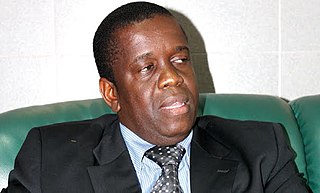
Daviz Mbepo Simango was a Mozambican politician who was Mayor of Beira from 2003 to the day of his death in February 2021. He was also the President of the Democratic Movement of Mozambique (MDM). He was son of Uria Timoteo Simango the first Vice-President of FRELIMO and Celina Tapua Simango. He joined the main opposition party RENAMO in 1997 and became Mayor of Beira in 2003 as its candidate. On March 6, 2009, he founded a new party, the Movimento Democrático de Moçambique, or MDM.

General elections were held in Mozambique on 15 October 2014. Filipe Nyusi, the candidate of the ruling FRELIMO, was elected president, and FRELIMO retained its parliamentary majority.

The RENAMO insurgency was a guerrilla campaign by militants of the RENAMO party and one of its splinter factions in Mozambique. The insurgency was widely considered to be an aftershock of the Mozambican Civil War; it resulted in renewed tensions between RENAMO and Mozambique's ruling FRELIMO coalition over charges of state corruption and the disputed results of the 2014 general elections.

General elections were held in Mozambique on 15 October 2019. During the leadup to the elections, assassinations and significant intimidation of prominent leaders of opposition parties and election observers were alleged. In addition, state resources, media, and aid for cyclone victims were also alleged to be used in favour of the ruling party (FRELIMO) and its candidates. Local elections observers, civil society organizations, the Commonwealth Observer Group, the European Union Election Observation Mission, and several national and international entities classified the elections as rigged. Nevertheless, the incumbent president Filipe Nyusi of FRELIMO was declared re-elected with 73% of the vote. The main opposition party RENAMO as well as the other oppositions parties involved in the elections contested the results, claiming there were numerous irregularities, and accusing FRELIMO of "massive electoral fraud", including hundreds of thousands of "ghost voters". As evidence for the international community, Ossufo Momade, the president of the main opposition party RENAMO, transported to Europe a box filled with vote ballots that had been marked in favor of the incumbent president Filipe Nyusi of FRELIMO before the commencement of voting. Despite these occurrences, the international community largely ignored any concerns of fraud, and gradually countries started recognizing the incumbent president Filipe Nyusi of FRELIMO as the winner of the elections.

General elections were held in Mozambique on 9 October 2024 to elect the president, the 250 members of the Assembly of the Republic and members of the ten provincial assemblies.

Venâncio António Bila Mondlane is a Mozambican engineer and politician. In the 2024 presidential election, Mondlane ran for President of Mozambique as a member of the PODEMOS party.

Lutero Simango is a Mozambique politician from the Democratic Movement of Mozambique (MDM). He has been a member of the Assembly of the Republic since 2000, where he is leader of his party.
Since 11 October 2024, demonstrators in Mozambique have mounted protests against the 2024 Mozambican general election.




